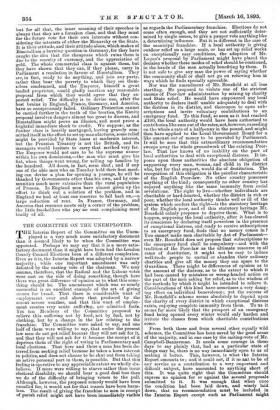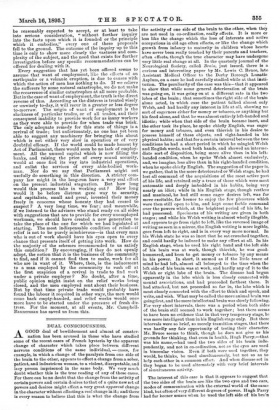THE COMMITTEE ON THE UNEMPLOYED. T HE Interim Report of the
Committee on the Unem- ployed is a very much more satisfactory document than it seemed likely to be when the Committee was appointed. Perhaps we may say that it is a more satis- factory document than it might have been had the London County Council Elections been of a different complexion. Even as it is, the Interim Report was adopted by a narrow majority ; while one important amendment was only defeated by the casting vote of the chairman. We may assume, therefore, that the Radical and the Labour votes were cast on the side of doing something, though here there was great difference of opinion as to what this some- thing should be. The amendment which was so nearly successful is an excellent example of the art of giving stones for bread. That there is considerable want of employment over and above that produced by the recent severe weather, and that this want of employ- ment creates very acute suffer?ng, are admitted facts. Yet ten Members of the Committee proposed to relieve this suffering not by food, not by fuel, not by clothing, but by a change in the law relating to the franchise. The Committee were asked to say, and one half of them were willing to say, that under the present law men do not get relief because they will not ask for it, and that they will not ask for it because the receipt of it deprives them of the right of voting in Parliamentary and local elections. That here and there a man has been de- terred from seeking relief because he takes a keen interest in politics, and does not choose to be shut out from taking an active personal part in them, is possible. But that this feeling is operative to any appreciable extent we wholly dis- believe. If more were willing to starve rather than incur electoral disability, we should hear a good deal less than we do of the difficulty of bringing voters to the poll. Although, however, the proposed remedy would have been uncalled for, it would not for that reason have been harm- less. The result of giving the franchise to men in receipt of parish relief might not have been immediately visible as regards the Parliamentary franchise. Elections do not come often enough, and they are not sufficiently deter- mined by single issues, to give a pauper vote anything like a determining influence. But it is different in the case of the municipal franchise. If a local authority is giving outdoor relief on a large scale, or has set up relief works on exceptionally easy conditions, the adoption of Mr. Logan's proposal by Parliament might have placed. the decision whether these modes of relief should be continued, in the hands of the men actually benefiting by them. It is not safe to give any man the power of saying whether the community shall or shall not go on relieving him in ways which he finds specially agreeable. Nor was the amendment of Mr. Bousfield at all less startling. He proposed to violate one of the strictest canons of Poor-law administration by mixing up charity and State relief. He would have empowered any local authority to declare itself unable adequately to deal with the distress in its district, and thereupon to open sub- scriptions and invite voluntary contributions to an emergency fund. To this fund, so soon as it had reached £100, the local authority would have been authorised to contribute a like sum out of the rates, not, however, exceeding on the whole a rate of a halfpenny in the pound, and might then have applied to the Local Government Board for a like amount out of money to be provided by Parliament. It will be seen that this extraordinary recommendation sweeps away the whole groundwork of the existing Poor- law. That law knows of no inability on the part of local authorities to deal with exceptional distress. It im- poses upon those authorities the absolute obligation of supporting every man, woman, and child in its district who, but for that support, would die of destitution. The recognition of this obligation is the peculiar characteristic of the English Poor-law. No other country possesses anything of the kind ; consequently no other country has enjoyed anything like the same immunity from social revolutions. The right to live—whether individuals are charitable or hard-hearted, whether the district is rich or poor, whether the local authority thinks well or ill of the system which confers the right—is the statutory heritage of the English poor, and of this statutory heritage Mr. Bousfield calmly proposes to deprive them. What is to happen, supposing the local authority, after it has cleared its conscience by declaring itself powerless in the presence of exceptional distress, and ready to receive subscriptions to an emergency fund, finds that no money comes in ? You cannot make men charitable by Act of Parliament— even Mr. Bousfield does not propose that subscriptions to the emergency fund shall be compulsory—and with the tradition of the Poor-law as the ultimate resource in all cases of destitution, it might not be easy to induce well-to-do people to curtail or abandon their ordinary charities and give all the money they can spare to the Guardians. There might be differences of opinion as to the amount of the distress, as to the extent to which it had. been caused by mistaken or wrong-headed action on the part of the men asking for relief, as to the wisdom of the methods by which it might be intended to relieve it. Considerations of this kind have sometimes a very damp- ing effect on individual benevolence; yet the success of Mr. Bousfield's scheme seems absolutely to depend upon the charity of every district in which exceptional distress exists, enjoying complete immunity from them. To us it seems far more likely that the prospect of an emergency fund being opened every winter would only harden and irritate the classes from which charitable contributions come.
From both these and from several other equally wild schemes, the Committee has been saved by the good sense of the majority, and in one case by the casting-vote of Mr. Campbell-Bannerman. It needs some courage in these days to say plainly that, bad as a particular state of things may be, there is no way immediately open to us of making it better. This, however, is what the Interim Report amounts to ; and it could not, if it nn ant to be of any service as a contribution to a very important and difficult subject, have amounted to anything short of this. It was quite right that the Committee should express no opinion for or against the several proposals submitted to it. It was enough that when once the condition had been laid down, and wisely laid down, that no recommendation must be included in the Interim Report except such as Parliament might be reasonably expected to accept, or at least to take into serious consideration, "without further inquiry into the facts upon which it is founded or the principle which it embodies," every one of these proposals fell to the ground. The outcome of the inquiry up to this time is only to show more clearly the vastness and com- plexity of the subject, and the need that exists for further investigation before any specific recommendations can be offered for dealing with it. Every suggestion that has yet been offered seems to assume that want of employment, like the effects of an earthquake or a volcanic eruption, is due to causes with which the action of men has nothing to do. If we relieve the sufferers by some natural catastrophe, we do not make the recurrence of similar catastrophes at all more probable. Butin the case of want of employment, the truth is the direct reverse of this. According as the distress is treated wisely or unwisely to-day, it will recur in a greater or less degree to-morrow. The origin of want of employment is the slackness of particular trades, or of all trades, and their consequent inability to provide work for as Many workers as they were able to provide for when trade was brisk. The only adequate remedy for this state of things is a revival of trade ; but unfortunately, no one has yet been able to suggest any machinery for bringing this about which is not either very slow in operation or of very doubtful efficacy. If the world could be made honest by Act of Parliament, there would soon be no lack of employ- ment. All the unused capital which is now filling the banks, and raising the price of every sound security, would at once find its way into industrial operations, and enlist the services of every able-bodied work- man. Nor do we say that Parliament might not usefully do something in this direction. A stricter com- pany law might in the long-run have a very real effect on the present industrial stagnation. But how long would this process take in working out ? How long would it be before distrust gave way to security, and capitalists, small and great, invested their money freely in concerns whose honesty they had ceased to suspect? A very long time, we fear ; and meanwhile, if we listened to the advisers who stand ready on all sides with suggestions that are to provide for every unemployed workman, we should have created a new generation to take the place of the one for which we had legislated at starting. The most indispensable condition of relief—if relief is not to be purely mischievous—is that every man who is out of work should have his eyes open to every chance that presents itself of getting into work. How do the majority of the schemes recommended to us satisfy this condition ? By encouraging, if they do not openly adopt, the notion that it is the business of the community to find, and if it cannot find then to make, work for all who are in want of it. Where, then, is the inducement to a man employed by the community to rush off at the first suspicion of a revival in trade to find work under a private employer ? No doubt, after a time, public opinion might insist on the relief works being closed, and the men employed sent about their business. But by that time private trade would probably have found the labour it required in other ways, the men would come back empty-handed, and relief works would once more have to be started under the pressure of fresh dis- tress. For the moment, at all events, Mr. Campbell- Bannerman has saved us from this.



































 Previous page
Previous page